Essay: Examining Cheating, Ethics, and Moral Behavior
VerifiedAdded on 2023/06/03
|6
|1863
|198
Essay
AI Summary
This essay critically examines the pervasive issue of cheating, refuting the notion that it is acceptable. It delves into the psychological and ethical dimensions of dishonesty, exploring the factors that contribute to unethical behavior, such as moral judgment, trust, and credibility. The essay highlights the negative consequences of cheating, including damaged relationships and compromised academic and professional success. It discusses the role of various influences, including family, society, and educational institutions, in shaping individuals' moral values and attitudes towards cheating. The essay emphasizes the importance of fostering ethical environments and promoting honesty, ultimately arguing that cheating is inherently wrong and detrimental to personal and societal well-being.
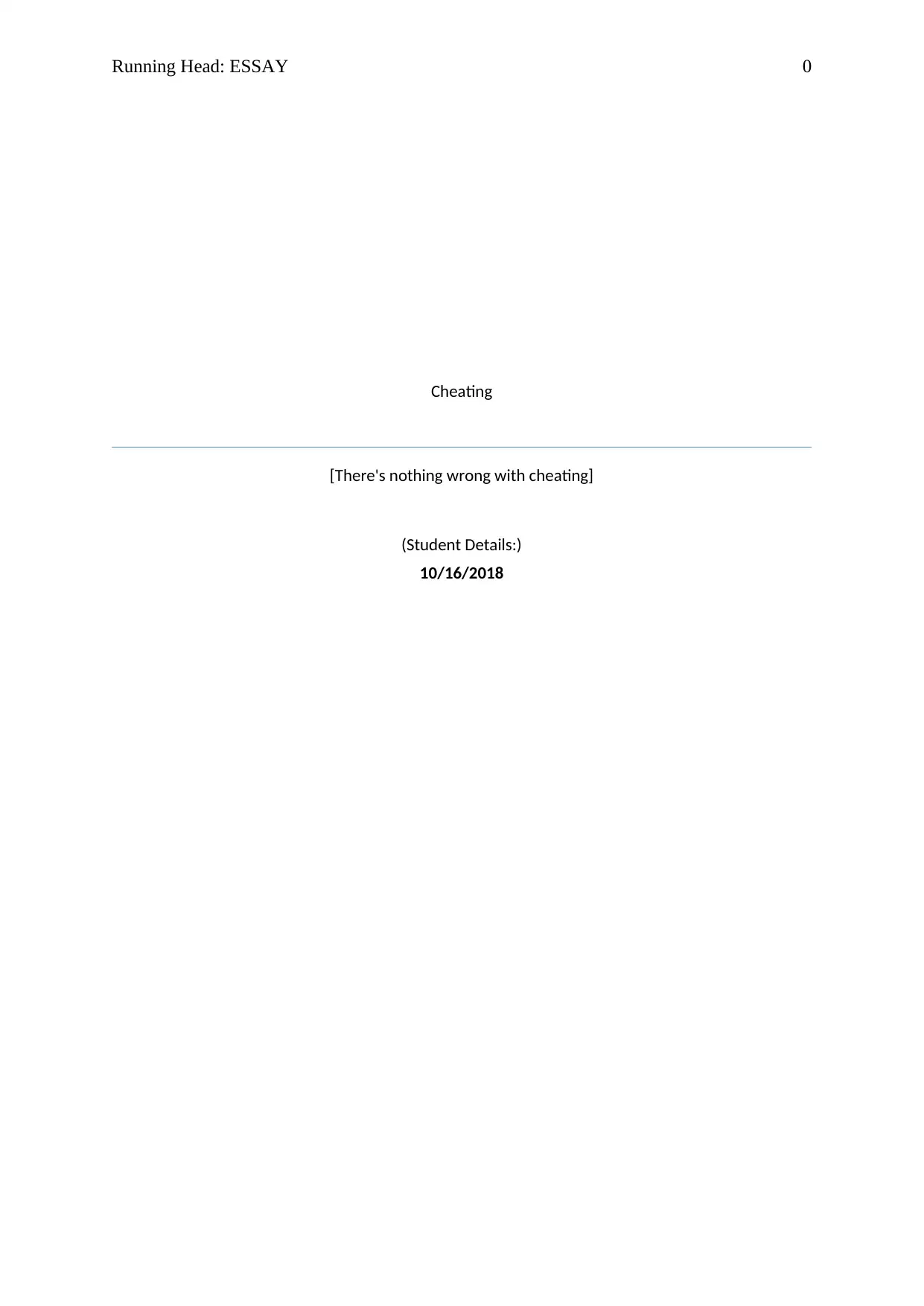
Running Head: ESSAY 0
Cheating
[There's nothing wrong with cheating]
(Student Details:)
10/16/2018
Cheating
[There's nothing wrong with cheating]
(Student Details:)
10/16/2018
Paraphrase This Document
Need a fresh take? Get an instant paraphrase of this document with our AI Paraphraser
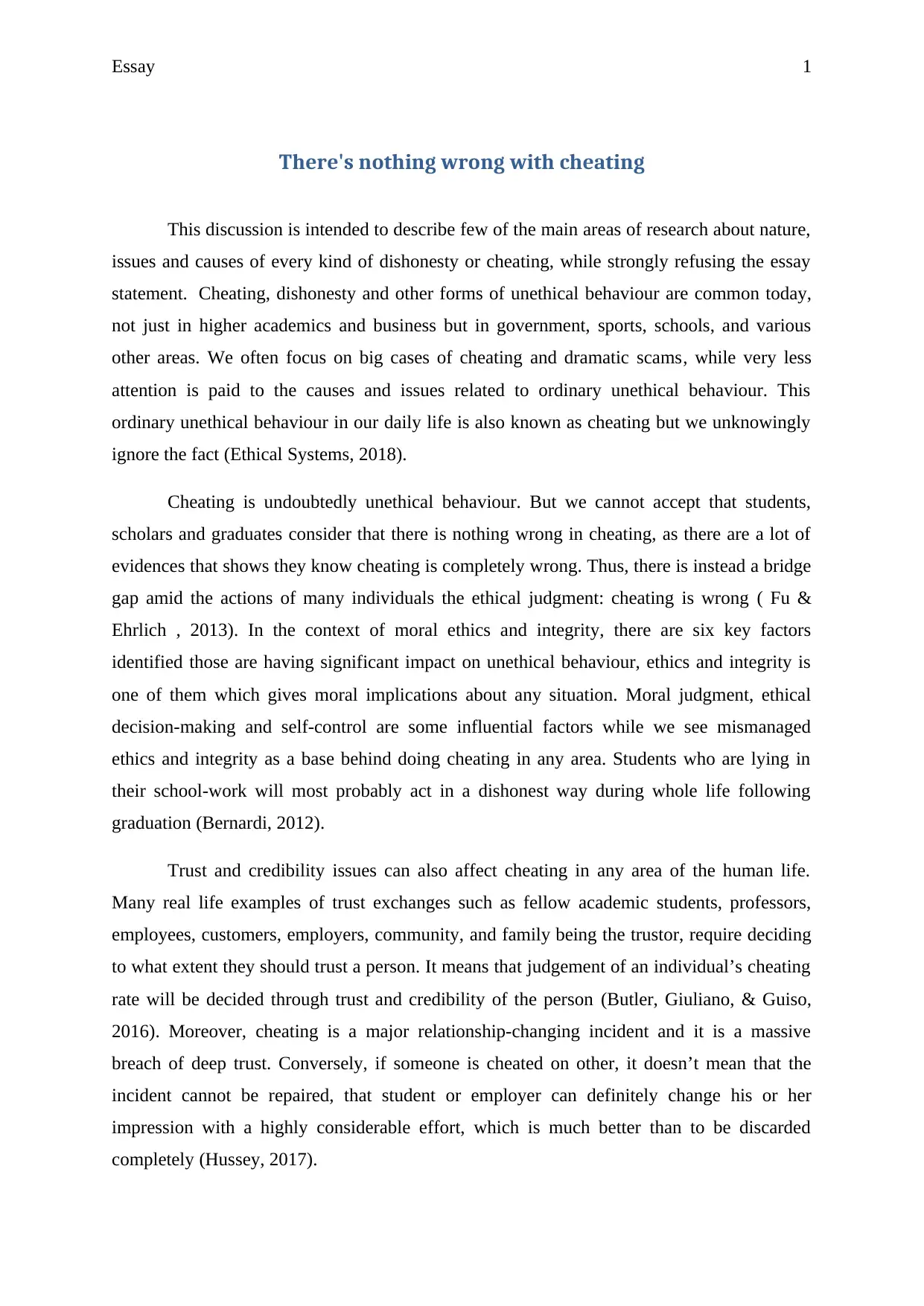
Essay 1
There's nothing wrong with cheating
This discussion is intended to describe few of the main areas of research about nature,
issues and causes of every kind of dishonesty or cheating, while strongly refusing the essay
statement. Cheating, dishonesty and other forms of unethical behaviour are common today,
not just in higher academics and business but in government, sports, schools, and various
other areas. We often focus on big cases of cheating and dramatic scams, while very less
attention is paid to the causes and issues related to ordinary unethical behaviour. This
ordinary unethical behaviour in our daily life is also known as cheating but we unknowingly
ignore the fact (Ethical Systems, 2018).
Cheating is undoubtedly unethical behaviour. But we cannot accept that students,
scholars and graduates consider that there is nothing wrong in cheating, as there are a lot of
evidences that shows they know cheating is completely wrong. Thus, there is instead a bridge
gap amid the actions of many individuals the ethical judgment: cheating is wrong ( Fu &
Ehrlich , 2013). In the context of moral ethics and integrity, there are six key factors
identified those are having significant impact on unethical behaviour, ethics and integrity is
one of them which gives moral implications about any situation. Moral judgment, ethical
decision-making and self-control are some influential factors while we see mismanaged
ethics and integrity as a base behind doing cheating in any area. Students who are lying in
their school-work will most probably act in a dishonest way during whole life following
graduation (Bernardi, 2012).
Trust and credibility issues can also affect cheating in any area of the human life.
Many real life examples of trust exchanges such as fellow academic students, professors,
employees, customers, employers, community, and family being the trustor, require deciding
to what extent they should trust a person. It means that judgement of an individual’s cheating
rate will be decided through trust and credibility of the person (Butler, Giuliano, & Guiso,
2016). Moreover, cheating is a major relationship-changing incident and it is a massive
breach of deep trust. Conversely, if someone is cheated on other, it doesn’t mean that the
incident cannot be repaired, that student or employer can definitely change his or her
impression with a highly considerable effort, which is much better than to be discarded
completely (Hussey, 2017).
There's nothing wrong with cheating
This discussion is intended to describe few of the main areas of research about nature,
issues and causes of every kind of dishonesty or cheating, while strongly refusing the essay
statement. Cheating, dishonesty and other forms of unethical behaviour are common today,
not just in higher academics and business but in government, sports, schools, and various
other areas. We often focus on big cases of cheating and dramatic scams, while very less
attention is paid to the causes and issues related to ordinary unethical behaviour. This
ordinary unethical behaviour in our daily life is also known as cheating but we unknowingly
ignore the fact (Ethical Systems, 2018).
Cheating is undoubtedly unethical behaviour. But we cannot accept that students,
scholars and graduates consider that there is nothing wrong in cheating, as there are a lot of
evidences that shows they know cheating is completely wrong. Thus, there is instead a bridge
gap amid the actions of many individuals the ethical judgment: cheating is wrong ( Fu &
Ehrlich , 2013). In the context of moral ethics and integrity, there are six key factors
identified those are having significant impact on unethical behaviour, ethics and integrity is
one of them which gives moral implications about any situation. Moral judgment, ethical
decision-making and self-control are some influential factors while we see mismanaged
ethics and integrity as a base behind doing cheating in any area. Students who are lying in
their school-work will most probably act in a dishonest way during whole life following
graduation (Bernardi, 2012).
Trust and credibility issues can also affect cheating in any area of the human life.
Many real life examples of trust exchanges such as fellow academic students, professors,
employees, customers, employers, community, and family being the trustor, require deciding
to what extent they should trust a person. It means that judgement of an individual’s cheating
rate will be decided through trust and credibility of the person (Butler, Giuliano, & Guiso,
2016). Moreover, cheating is a major relationship-changing incident and it is a massive
breach of deep trust. Conversely, if someone is cheated on other, it doesn’t mean that the
incident cannot be repaired, that student or employer can definitely change his or her
impression with a highly considerable effort, which is much better than to be discarded
completely (Hussey, 2017).
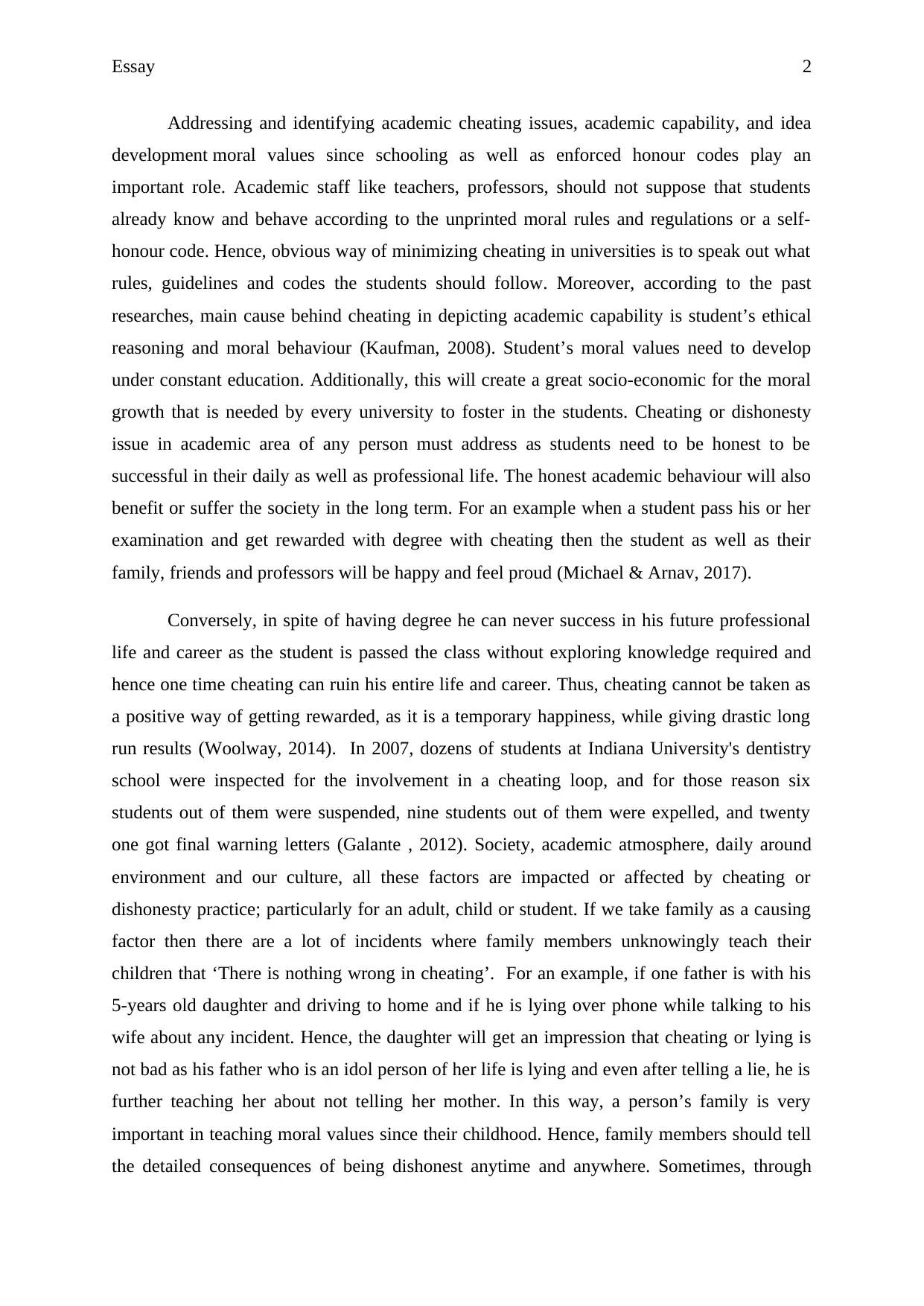
Essay 2
Addressing and identifying academic cheating issues, academic capability, and idea
development moral values since schooling as well as enforced honour codes play an
important role. Academic staff like teachers, professors, should not suppose that students
already know and behave according to the unprinted moral rules and regulations or a self-
honour code. Hence, obvious way of minimizing cheating in universities is to speak out what
rules, guidelines and codes the students should follow. Moreover, according to the past
researches, main cause behind cheating in depicting academic capability is student’s ethical
reasoning and moral behaviour (Kaufman, 2008). Student’s moral values need to develop
under constant education. Additionally, this will create a great socio-economic for the moral
growth that is needed by every university to foster in the students. Cheating or dishonesty
issue in academic area of any person must address as students need to be honest to be
successful in their daily as well as professional life. The honest academic behaviour will also
benefit or suffer the society in the long term. For an example when a student pass his or her
examination and get rewarded with degree with cheating then the student as well as their
family, friends and professors will be happy and feel proud (Michael & Arnav, 2017).
Conversely, in spite of having degree he can never success in his future professional
life and career as the student is passed the class without exploring knowledge required and
hence one time cheating can ruin his entire life and career. Thus, cheating cannot be taken as
a positive way of getting rewarded, as it is a temporary happiness, while giving drastic long
run results (Woolway, 2014). In 2007, dozens of students at Indiana University's dentistry
school were inspected for the involvement in a cheating loop, and for those reason six
students out of them were suspended, nine students out of them were expelled, and twenty
one got final warning letters (Galante , 2012). Society, academic atmosphere, daily around
environment and our culture, all these factors are impacted or affected by cheating or
dishonesty practice; particularly for an adult, child or student. If we take family as a causing
factor then there are a lot of incidents where family members unknowingly teach their
children that ‘There is nothing wrong in cheating’. For an example, if one father is with his
5-years old daughter and driving to home and if he is lying over phone while talking to his
wife about any incident. Hence, the daughter will get an impression that cheating or lying is
not bad as his father who is an idol person of her life is lying and even after telling a lie, he is
further teaching her about not telling her mother. In this way, a person’s family is very
important in teaching moral values since their childhood. Hence, family members should tell
the detailed consequences of being dishonest anytime and anywhere. Sometimes, through
Addressing and identifying academic cheating issues, academic capability, and idea
development moral values since schooling as well as enforced honour codes play an
important role. Academic staff like teachers, professors, should not suppose that students
already know and behave according to the unprinted moral rules and regulations or a self-
honour code. Hence, obvious way of minimizing cheating in universities is to speak out what
rules, guidelines and codes the students should follow. Moreover, according to the past
researches, main cause behind cheating in depicting academic capability is student’s ethical
reasoning and moral behaviour (Kaufman, 2008). Student’s moral values need to develop
under constant education. Additionally, this will create a great socio-economic for the moral
growth that is needed by every university to foster in the students. Cheating or dishonesty
issue in academic area of any person must address as students need to be honest to be
successful in their daily as well as professional life. The honest academic behaviour will also
benefit or suffer the society in the long term. For an example when a student pass his or her
examination and get rewarded with degree with cheating then the student as well as their
family, friends and professors will be happy and feel proud (Michael & Arnav, 2017).
Conversely, in spite of having degree he can never success in his future professional
life and career as the student is passed the class without exploring knowledge required and
hence one time cheating can ruin his entire life and career. Thus, cheating cannot be taken as
a positive way of getting rewarded, as it is a temporary happiness, while giving drastic long
run results (Woolway, 2014). In 2007, dozens of students at Indiana University's dentistry
school were inspected for the involvement in a cheating loop, and for those reason six
students out of them were suspended, nine students out of them were expelled, and twenty
one got final warning letters (Galante , 2012). Society, academic atmosphere, daily around
environment and our culture, all these factors are impacted or affected by cheating or
dishonesty practice; particularly for an adult, child or student. If we take family as a causing
factor then there are a lot of incidents where family members unknowingly teach their
children that ‘There is nothing wrong in cheating’. For an example, if one father is with his
5-years old daughter and driving to home and if he is lying over phone while talking to his
wife about any incident. Hence, the daughter will get an impression that cheating or lying is
not bad as his father who is an idol person of her life is lying and even after telling a lie, he is
further teaching her about not telling her mother. In this way, a person’s family is very
important in teaching moral values since their childhood. Hence, family members should tell
the detailed consequences of being dishonest anytime and anywhere. Sometimes, through
⊘ This is a preview!⊘
Do you want full access?
Subscribe today to unlock all pages.

Trusted by 1+ million students worldwide
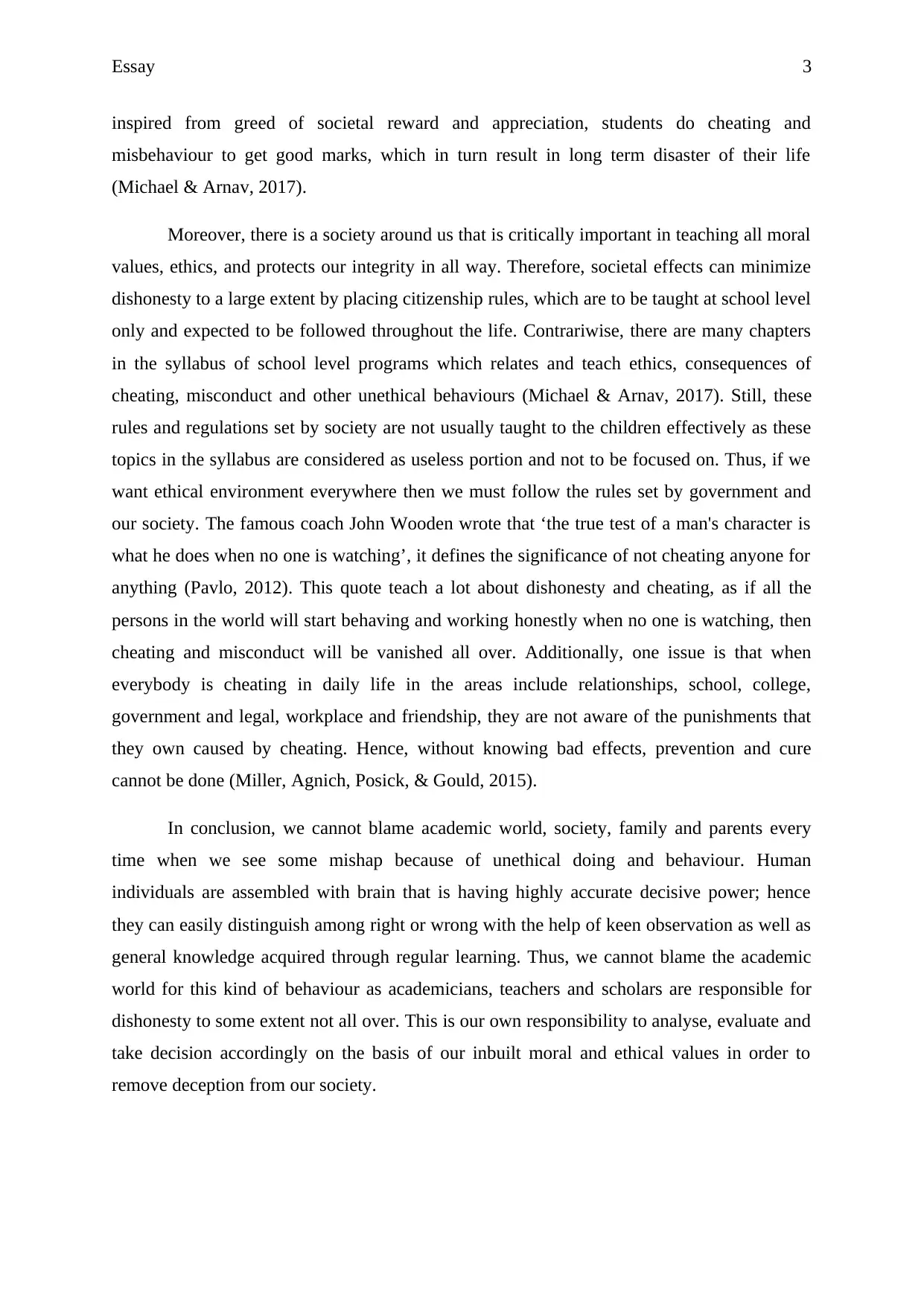
Essay 3
inspired from greed of societal reward and appreciation, students do cheating and
misbehaviour to get good marks, which in turn result in long term disaster of their life
(Michael & Arnav, 2017).
Moreover, there is a society around us that is critically important in teaching all moral
values, ethics, and protects our integrity in all way. Therefore, societal effects can minimize
dishonesty to a large extent by placing citizenship rules, which are to be taught at school level
only and expected to be followed throughout the life. Contrariwise, there are many chapters
in the syllabus of school level programs which relates and teach ethics, consequences of
cheating, misconduct and other unethical behaviours (Michael & Arnav, 2017). Still, these
rules and regulations set by society are not usually taught to the children effectively as these
topics in the syllabus are considered as useless portion and not to be focused on. Thus, if we
want ethical environment everywhere then we must follow the rules set by government and
our society. The famous coach John Wooden wrote that ‘the true test of a man's character is
what he does when no one is watching’, it defines the significance of not cheating anyone for
anything (Pavlo, 2012). This quote teach a lot about dishonesty and cheating, as if all the
persons in the world will start behaving and working honestly when no one is watching, then
cheating and misconduct will be vanished all over. Additionally, one issue is that when
everybody is cheating in daily life in the areas include relationships, school, college,
government and legal, workplace and friendship, they are not aware of the punishments that
they own caused by cheating. Hence, without knowing bad effects, prevention and cure
cannot be done (Miller, Agnich, Posick, & Gould, 2015).
In conclusion, we cannot blame academic world, society, family and parents every
time when we see some mishap because of unethical doing and behaviour. Human
individuals are assembled with brain that is having highly accurate decisive power; hence
they can easily distinguish among right or wrong with the help of keen observation as well as
general knowledge acquired through regular learning. Thus, we cannot blame the academic
world for this kind of behaviour as academicians, teachers and scholars are responsible for
dishonesty to some extent not all over. This is our own responsibility to analyse, evaluate and
take decision accordingly on the basis of our inbuilt moral and ethical values in order to
remove deception from our society.
inspired from greed of societal reward and appreciation, students do cheating and
misbehaviour to get good marks, which in turn result in long term disaster of their life
(Michael & Arnav, 2017).
Moreover, there is a society around us that is critically important in teaching all moral
values, ethics, and protects our integrity in all way. Therefore, societal effects can minimize
dishonesty to a large extent by placing citizenship rules, which are to be taught at school level
only and expected to be followed throughout the life. Contrariwise, there are many chapters
in the syllabus of school level programs which relates and teach ethics, consequences of
cheating, misconduct and other unethical behaviours (Michael & Arnav, 2017). Still, these
rules and regulations set by society are not usually taught to the children effectively as these
topics in the syllabus are considered as useless portion and not to be focused on. Thus, if we
want ethical environment everywhere then we must follow the rules set by government and
our society. The famous coach John Wooden wrote that ‘the true test of a man's character is
what he does when no one is watching’, it defines the significance of not cheating anyone for
anything (Pavlo, 2012). This quote teach a lot about dishonesty and cheating, as if all the
persons in the world will start behaving and working honestly when no one is watching, then
cheating and misconduct will be vanished all over. Additionally, one issue is that when
everybody is cheating in daily life in the areas include relationships, school, college,
government and legal, workplace and friendship, they are not aware of the punishments that
they own caused by cheating. Hence, without knowing bad effects, prevention and cure
cannot be done (Miller, Agnich, Posick, & Gould, 2015).
In conclusion, we cannot blame academic world, society, family and parents every
time when we see some mishap because of unethical doing and behaviour. Human
individuals are assembled with brain that is having highly accurate decisive power; hence
they can easily distinguish among right or wrong with the help of keen observation as well as
general knowledge acquired through regular learning. Thus, we cannot blame the academic
world for this kind of behaviour as academicians, teachers and scholars are responsible for
dishonesty to some extent not all over. This is our own responsibility to analyse, evaluate and
take decision accordingly on the basis of our inbuilt moral and ethical values in order to
remove deception from our society.
Paraphrase This Document
Need a fresh take? Get an instant paraphrase of this document with our AI Paraphraser
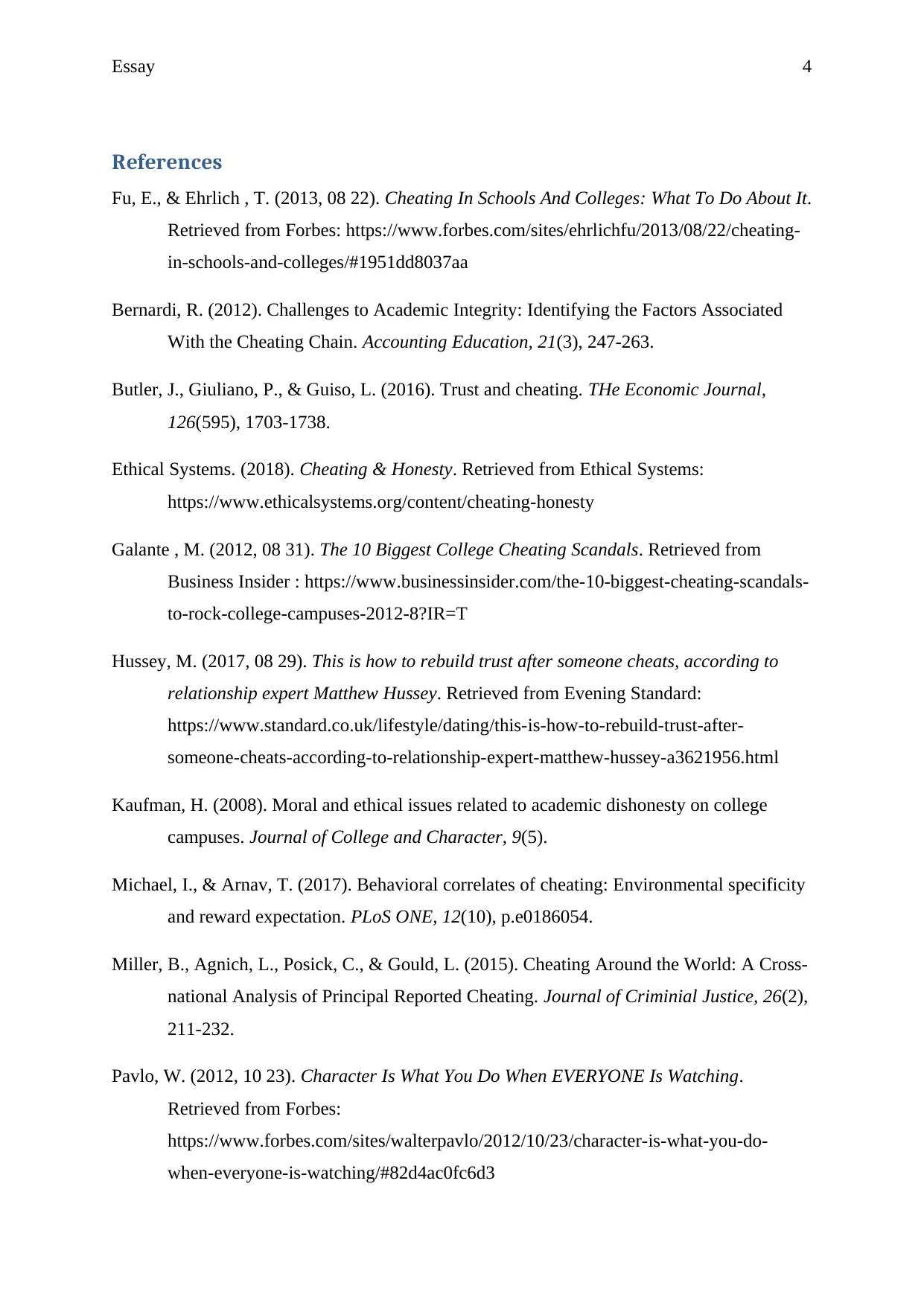
Essay 4
References
Fu, E., & Ehrlich , T. (2013, 08 22). Cheating In Schools And Colleges: What To Do About It.
Retrieved from Forbes: https://www.forbes.com/sites/ehrlichfu/2013/08/22/cheating-
in-schools-and-colleges/#1951dd8037aa
Bernardi, R. (2012). Challenges to Academic Integrity: Identifying the Factors Associated
With the Cheating Chain. Accounting Education, 21(3), 247-263.
Butler, J., Giuliano, P., & Guiso, L. (2016). Trust and cheating. THe Economic Journal,
126(595), 1703-1738.
Ethical Systems. (2018). Cheating & Honesty. Retrieved from Ethical Systems:
https://www.ethicalsystems.org/content/cheating-honesty
Galante , M. (2012, 08 31). The 10 Biggest College Cheating Scandals. Retrieved from
Business Insider : https://www.businessinsider.com/the-10-biggest-cheating-scandals-
to-rock-college-campuses-2012-8?IR=T
Hussey, M. (2017, 08 29). This is how to rebuild trust after someone cheats, according to
relationship expert Matthew Hussey. Retrieved from Evening Standard:
https://www.standard.co.uk/lifestyle/dating/this-is-how-to-rebuild-trust-after-
someone-cheats-according-to-relationship-expert-matthew-hussey-a3621956.html
Kaufman, H. (2008). Moral and ethical issues related to academic dishonesty on college
campuses. Journal of College and Character, 9(5).
Michael, I., & Arnav, T. (2017). Behavioral correlates of cheating: Environmental specificity
and reward expectation. PLoS ONE, 12(10), p.e0186054.
Miller, B., Agnich, L., Posick, C., & Gould, L. (2015). Cheating Around the World: A Cross-
national Analysis of Principal Reported Cheating. Journal of Criminial Justice, 26(2),
211-232.
Pavlo, W. (2012, 10 23). Character Is What You Do When EVERYONE Is Watching.
Retrieved from Forbes:
https://www.forbes.com/sites/walterpavlo/2012/10/23/character-is-what-you-do-
when-everyone-is-watching/#82d4ac0fc6d3
References
Fu, E., & Ehrlich , T. (2013, 08 22). Cheating In Schools And Colleges: What To Do About It.
Retrieved from Forbes: https://www.forbes.com/sites/ehrlichfu/2013/08/22/cheating-
in-schools-and-colleges/#1951dd8037aa
Bernardi, R. (2012). Challenges to Academic Integrity: Identifying the Factors Associated
With the Cheating Chain. Accounting Education, 21(3), 247-263.
Butler, J., Giuliano, P., & Guiso, L. (2016). Trust and cheating. THe Economic Journal,
126(595), 1703-1738.
Ethical Systems. (2018). Cheating & Honesty. Retrieved from Ethical Systems:
https://www.ethicalsystems.org/content/cheating-honesty
Galante , M. (2012, 08 31). The 10 Biggest College Cheating Scandals. Retrieved from
Business Insider : https://www.businessinsider.com/the-10-biggest-cheating-scandals-
to-rock-college-campuses-2012-8?IR=T
Hussey, M. (2017, 08 29). This is how to rebuild trust after someone cheats, according to
relationship expert Matthew Hussey. Retrieved from Evening Standard:
https://www.standard.co.uk/lifestyle/dating/this-is-how-to-rebuild-trust-after-
someone-cheats-according-to-relationship-expert-matthew-hussey-a3621956.html
Kaufman, H. (2008). Moral and ethical issues related to academic dishonesty on college
campuses. Journal of College and Character, 9(5).
Michael, I., & Arnav, T. (2017). Behavioral correlates of cheating: Environmental specificity
and reward expectation. PLoS ONE, 12(10), p.e0186054.
Miller, B., Agnich, L., Posick, C., & Gould, L. (2015). Cheating Around the World: A Cross-
national Analysis of Principal Reported Cheating. Journal of Criminial Justice, 26(2),
211-232.
Pavlo, W. (2012, 10 23). Character Is What You Do When EVERYONE Is Watching.
Retrieved from Forbes:
https://www.forbes.com/sites/walterpavlo/2012/10/23/character-is-what-you-do-
when-everyone-is-watching/#82d4ac0fc6d3
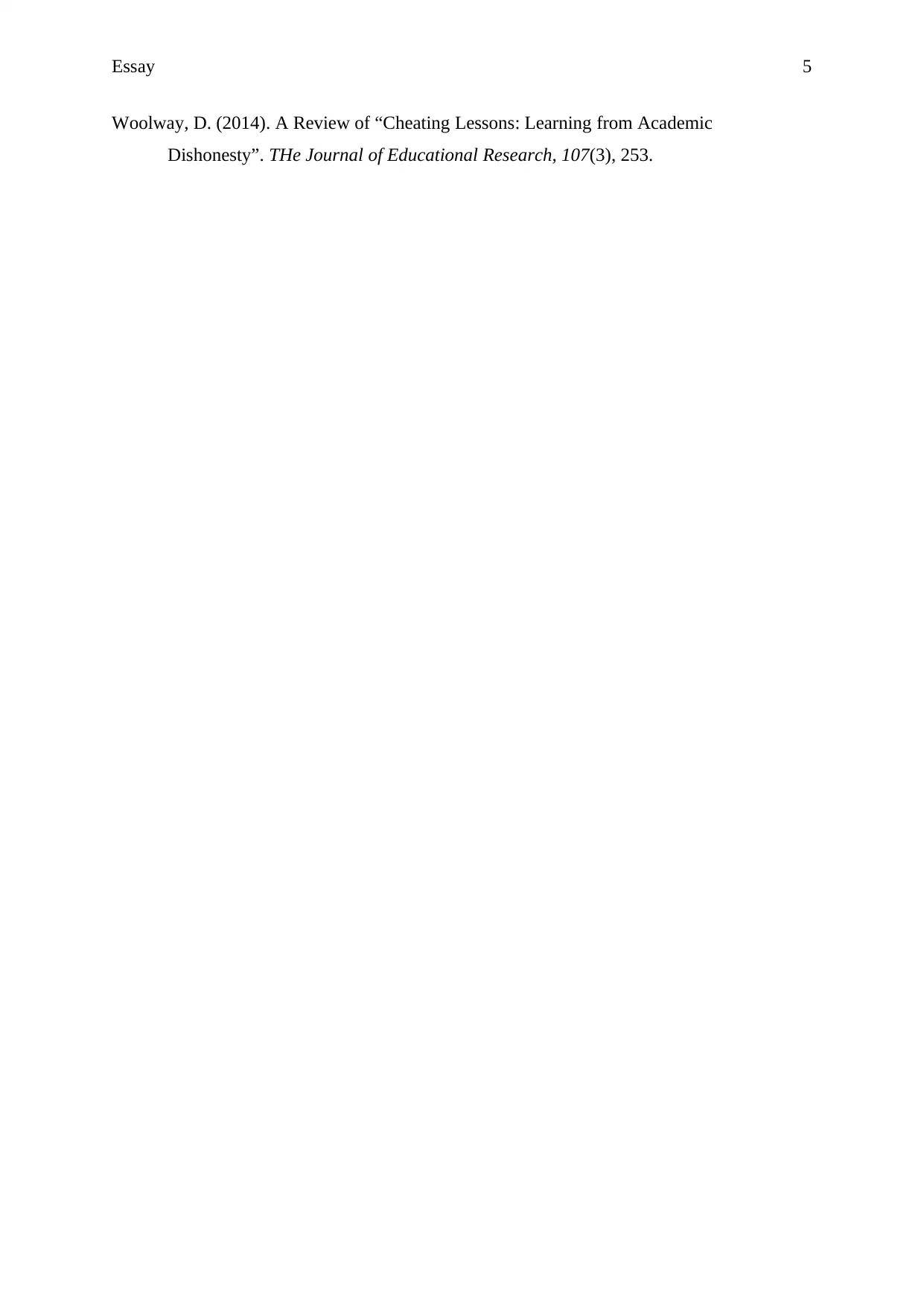
Essay 5
Woolway, D. (2014). A Review of “Cheating Lessons: Learning from Academic
Dishonesty”. THe Journal of Educational Research, 107(3), 253.
Woolway, D. (2014). A Review of “Cheating Lessons: Learning from Academic
Dishonesty”. THe Journal of Educational Research, 107(3), 253.
⊘ This is a preview!⊘
Do you want full access?
Subscribe today to unlock all pages.

Trusted by 1+ million students worldwide
1 out of 6
Related Documents
Your All-in-One AI-Powered Toolkit for Academic Success.
+13062052269
info@desklib.com
Available 24*7 on WhatsApp / Email
![[object Object]](/_next/static/media/star-bottom.7253800d.svg)
Unlock your academic potential
Copyright © 2020–2025 A2Z Services. All Rights Reserved. Developed and managed by ZUCOL.


